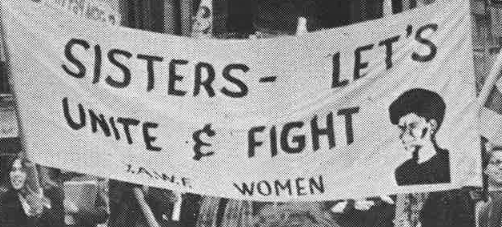March 7, 1970 – Historic International Working Women’s Day march to House of Detention
by Naomi Cohen
The following excerpt is from an article originally printed in the March 25, 1970, Workers World newspaper entitled, “A day of struggle in New York City — Militant demonstration marks International Women’s Day” written by Naomi Cohen.

YAWF banner leads march to Women’s House of Detention, 1970.
The occasion was March 7, the first International Women’s Day rally in this country in many years. In this city and around the country, women took this day to revive the revolutionary traditions of a day that is truly for women in struggle.
1,000 rally in New York City
The day was marked here by over 1,000 women and male supporters with a rally in Union Square and a militant march to New York’s Bastille — the Women’s House of Detention. The action was organized by the Women’s Caucus of Youth Against War and Fascism and included representatives from many women’s organizations. So that women with children could attend, men from YAWF staffed a childcare center at a nearby church during the rally.
When the rally ended, women poured out of Union Square Park and began a spirited march to the infamous Women’s House of Detention. They carried banners demanding equal pay for equal work, free and legal abortions, no job discrimination and freedom for Geraldine Robinson, a Black mother of five from Buffalo, who was framed up along with Martin Sostre for running a revolutionary bookstore in the Black community there.
Marching along the crowded streets, the women chanted, “Women, let’s unite and fight,” “Out of the house, out of the jails, out from under, women unite,” and “Free our sisters, free ourselves. Free Joan Bird, free Erica Huggins.”
Speaking with jailed sisters
The march grew as it went, so that when it reached the prison, the demonstrators completely circled the building. Women prisoners waved and shouted out of the windows: “Free us,” “Power to the people” and “We want food.” The demonstrators stopped at the back of the prison, where they could hear the women best, and shouted up to their imprisoned sisters. “Hey, hey, ho, ho, The House of D has got to go’’ was picked up by the crowd. “Free Joan Bird” was raised again and again to demand freedom for the Panther woman now imprisoned there for almost a year on $100,000 ransom as a result of the frame-up of the New York Panther 21.
The cops were ominously moving in, harassing the demonstrators, but no one was moving. The women stood with fists raised and shouted up to the prisoners. It was finally suggested that the demonstrators demand their right to see prison authorities with a list of demands. As the women marched on the front of the prison, police moved in to block their way.
The women refused to give way and stood at the entrance of the prison chanting, “Free our sisters, free ourselves.” A handful of cops were nervously backed up against the prison wall, confronted by an angry crowd of determined women.
Finally, a squad of cops charged the demonstrators, pushing them away from the prison. Clubs started swinging, and the people were brutally manhandled. In the process, three women and three male supporters were arrested. The three women are Sharon Eolis, a leader in YAWF, and Rita Freed and Pam Kirkland, long-time activists in Youth Against War and Fascism and well-known to New York’s secret police. Three men, Mike Friedman, Steve Cagan and Jamie Fryer were also arrested.
Framed-up women and supporters
It took the cops two hours to decide to frame-up the demonstrators on very heavy charges. Sharon Eolis, Pam Kirkland and Steve Cagan are being charged with felonious assault on a cop, in addition to first-degree riot, also a felony. The defendants are also being charged with resisting arrest, harassment, obstruction of government administration and disorderly conduct.
The stiff charges make it clear that the women’s liberation movement can now expect the same kind of repression that the government has brought down on the Black Liberation and antiwar movements. Women’s liberation is spoken of as a joke in the capitalist press, but the moment women begin to struggle in militant actions, the repression comes down.

